Rwanda
In Rwanda, more than one-third of farmers have limited access to clean water as most need to travel far to fetch water for consumption and irrigation. But since farmers in the western district of Rulindo are predominately vegetable growers, there is a huge need for water.
One of the few options for them is rainfall, but much of the water runs-off from its steep hills owing to the area’s mountainous landscape. And this shortfall makes Yanze River, the main source of water for the district, serving also Rwanda’s capital city of Kigali for domestic use.
This diverse Yanze water needs from Rulindo farmers and the Kigali city creates a challenge as regards to water allocation. Local water company releases water to the rural communities only for few hours a day, mainly during the night, or very early in the morning. As a result, farmers do not have enough water to irrigate their fields, above all, when rainfalls are limited, or during the dry seasons.
To improve water management, the Food and Agriculture Organization of the United Nations (FAO) says it built six water ponds to support local farmers of the Yanze Horticulture Production Cooperative (YAHOPROC).
The Yanze river’s water is collected in the ponds and then brought from the ponds to the fields by three solar-powered pumps.The system provides a constant source of water that is evenly distributed to all the fields, including those that are most difficult to reach due to the hilly terrains.
The farmers are now able to grow vegetables all year long and sell their production to buyers in Kigali.Jean d’Arc Mubaranyanga, a farmer, said: “We no longer sit idly during the sunny season, worrying about how we can irrigate.
There is no such problem now, we have water and a machine which automatically pumps it for us.” The solar-powered pumps save fuel costs for the farmers and help increase the production.Mubaranyanga noted how, before, on 2 ares, he could barely harvest 60 kg of broccoli per season.
Since he started using this solar-powered pump, he can easily harvest 200 kg in the same area.The irrigation system allows farmers to cultivate enough food and ensure healthy diets to their families.“We could not eat vegetables before, now our nutrition is improved. Now, we have fruits and vegetables in every meal we have. We no longer have malnutrition issues. Children don’t suffer from Kwashiorkor (severe malnutrition),” said Mubaranyanga.
Around 150 Kilometers Southeast from Rulindo, in Ngoma district, the most drought-prone province of the country, FAO has built a spring catchment tap to collect water for the local communities.Spring water is usually fed from sand or gravel water-bearing soils, or from water flows through fissured rock. A spring catchment tap channels the natural outflow of groundwater into a pipe delivering safe water for consumption and irrigation.For many years, Alphonsine Mukeshimana, a 47 years old farmer and mother of 8 travelled 3-hour everyday to fetch water for use at home.
This time-consuming task took away valuable time from Alphonsine and her children. In addition, the water fetched was not clean and has caused health problems for the family.“My children and I had to fetch very dirty water, which always caused us intestinal worms,” said Mukeshimana.
The spring water has also become a source of safe water for the members of the community.Josepha Mukamana, the FAO RWEE Project Manager, noted how, “after seeing how cooperative members don’t have clean water, the idea of shooting two birds with one stone came.”“Now they can irrigate their crops and get clean water for their sanitation and nutrition,” he said.
In the dry season, this spring catchment serves nine villages that is around 300 people who can fetch clean water daily. Now it only takes Alphonsine 30 minutes to get clean water.“But since you (FAO) gave us clean water, we are healthy, we do not suffer from diseases related to dirty water because we now drink pure and clean water,” Mukeshimana said.
Through the “Rural Women Economic Empowerment” (RWEE) programme and the “Knowing water better” (KnoWat) project, FAO is working to promote sustainable access to water resources in Rwanda. Support is given to women farmers who are mainly involved in subsistence farming and have limited access to agriculture inputs due to their low economic capacity.For Gualbert Gbehounou, the FAO Representative in Rwanda, “this is what FAO, the UN is all about.”
“To make sure that we add our modest contribution to what can make the lives of rural women conducive to unleash their potential. Having access to water removes an impediment to the agricultural production of rural women. They can grow crops, rear livestock, and even produce fish, no matter the season. They provide their families with healthy food and even improve their incomes,” he said.
The theme of this year’s Word Water Day (22 March) is “Groundwater - making the invisible visible”. FAO calls on the critical importance of groundwater resources for food production and food security to meet global water and agricultural demands by 2050. It is also issuing a warrning on the threats of groundwater depletion for agricultural production, livelihoods and food security.




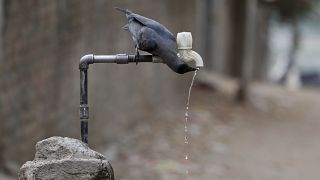
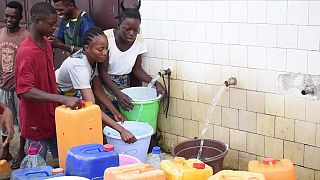
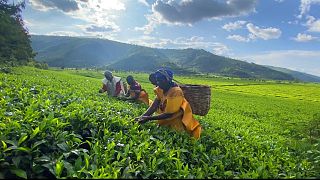

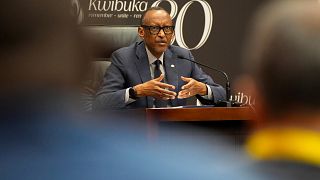



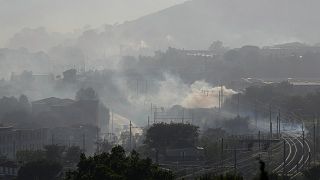
01:45
Empowering youth in agriculture could boost global economy, FAO report says
01:04
South Africa reports new bird flu outbreak on poultry farms
01:39
Sustainable development financing conference opens in Seville
01:52
In Goma, solar power brings light and hope in Ndosho neighbourhood
02:13
Congo and Rwanda sign a US-mediated peace deal aimed at ending decades of bloody conflict
00:54
African Human Rights court says it can hear case brought by DRC against Rwanda